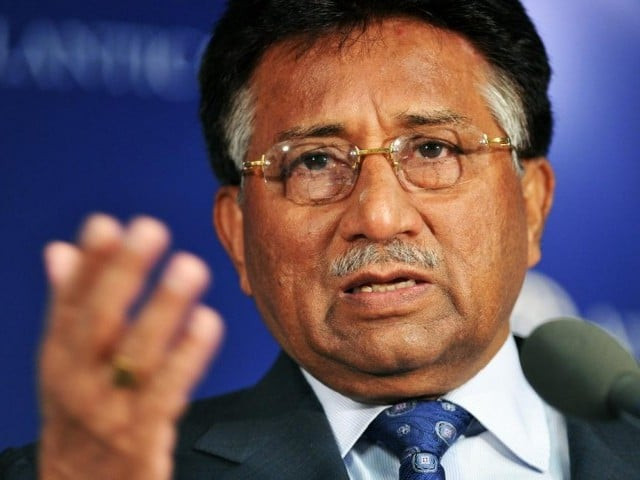Musharraf’s recovery not possible: Family
Former military ruler has been hospitalised for the last 3 weeks in UAE

The family of former military ruler General (retd) Pervez Musharraf, who has been living in Dubai since 2016, on Friday denied reports of his demise.
“He is not on the ventilator. Has been hospitalised for the last 3 weeks due to a complication of his ailment (amyloidosis)," the family wrote in a statement through Musharraf's official Twitter account.
"Going through a difficult stage where recovery is not possible and organs are malfunctioning. Pray for ease in his daily living," it added.
The statement came amid rumours of his death doing the rounds on social media and also reported by some Indian publications.
A source close to the former president’s family told The Express Tribune that all the rumours circulating on social media regarding the death of Musharraf were false.
The former ruler was admitted to the hospital after he complained of difficulty in breathing, the source added.
Message from Family:
— Pervez Musharraf (@P_Musharraf) June 10, 2022
He is not on the ventilator. Has been hospitalized for the last 3 weeks due to a complication of his ailment (Amyloidosis). Going through a difficult stage where recovery is not possible and organs are malfunctioning. Pray for ease in his daily living. pic.twitter.com/xuFIdhFOnc
Dr Muhammad Amjad, a close associate of Musharraf, also told The Express Tribune that the report of his demise was false. “He is alive and undergoing treatment.”
Amaan Khan Tareen, a spokesperson for the All Pakistan Muslim League (APML), Musharraf’s party, also dismissed the reports of his death.
Also read: Musharraf, his successors face notices over ‘enforced disappearances’
The 78-year-old former military ruler is suffering from amyloidosis, a rare disease caused by a build-up of an abnormal protein called amyloid in organs and tissues throughout the body, according to his family. The build-up of amyloid proteins (deposits) can make it difficult for the organs and tissues to work properly.
Amyloidosis can affect different organs in different people, and there are different types of amyloid. Amyloidosis frequently affects the heart, kidneys, liver, spleen, nervous system and digestive tract.
In a human body, plasma cells stored in bones perform the important function of making antibodies. However, a patient suffering from amyloidosis starts releasing protein from his plasma cells because of which antibodies called amyloid become dysfunctional and dangerous.
The diagnosis of the disease is confirmed by a blood test for amyloidosis called immunofixation. The patient may also catch anomalies in the nervous system and experience weakness in movement and body parts.
Symptoms of the disease include weakness, swollen bones and kidneys after which limbs may also swell. In addition, changes in the texture of hands and tongue are also experienced. The tongue becomes swollen. It can also affect the heart.
Dr Tahir Shamsi, a haematologist, said the progression of the disease could be controlled but the symptoms returned after a few months.
The disease generally manifests in patients over 70 years of age. In Pakistan, the prevalence rate for amyloidosis is 1.5%. The disease is not contagious and does not have genetic roots.
The former ruler’s illness came to light in 2018 when the APML announced that he was suffering from the rare disease.
Musharraf seized power in 1999 in a bloodless coup after the then-prime minister Nawaz Sharif tried to dismiss him as army chief, having appointed him above more senior officers a year earlier.
The four-star general was ruling Pakistan as a "chief executive" when the 9/11 attacks on the US took place, and swiftly aligned with Washington during its military intervention in neighbouring Afghanistan.
In more than seven years in office, he oversaw a stint of economic growth while dodging at least three assassination attempts.
Musharraf won a five-year term as president in a 2002 referendum, but reneged on promises to quit as army chief until late 2007.
His easygoing charm also failed to mask the blurring of the division between the state and army, and he fell out of favour after trying to sack the chief justice.
After the December 2007 assassination of opposition leader Benazir Bhutto, the national mood soured even more and crushing losses suffered by his allies in 2008 elections left him isolated.
Musharraf's plan to return to power in 2013 was dashed when he was disqualified from running in an election won by Nawaz -- the man he had deposed in 1999.
In 2016 a travel ban was lifted and Musharraf travelled to Dubai to seek medical treatment.
In 2014, Musharraf was indicted for suspending the Constitution on November 3, 2007.
The ex-military strongman was awarded the death sentence in absentia in a high treason case by a special court in December 2019.
However, a court later nullified the ruling.



















COMMENTS
Comments are moderated and generally will be posted if they are on-topic and not abusive.
For more information, please see our Comments FAQ